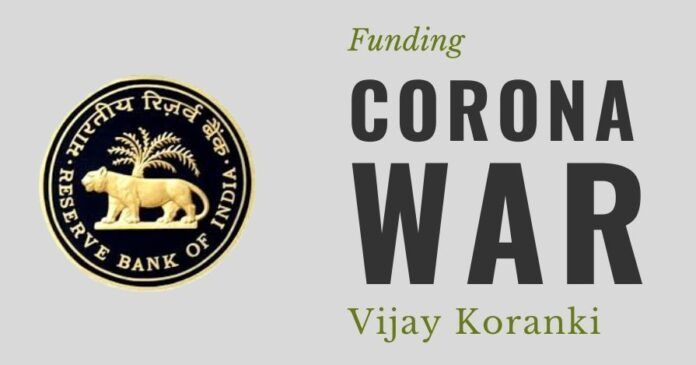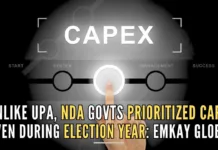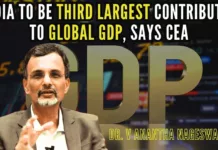
This is a war and wartime economics applies, not peacetime economics.
This is wartime, normal rules do not apply, wartime rules do. How to fund a war is a question as old as war itself, and the rule is to find the money to fight the war by any and all possible means.
The funds for this war will flow through two routes:
- The fiscal route where the GOI and the State Governments provide rations and direct cash transfers to those affected most. Also, to make up the shortfall in tax collection because the economy is frozen. To get funds for the Central Government to transfer to states as part of their share of Goods and Services Tax. The money needed to provide medical facilities to Corona infected, etc.
- There is also the monetary route where the RBI creates money and transfers it to the banks to provide liquidity to companies and other organizations to kick start the process of rebooting the economy. And to keep the companies going when the revenues are frozen.
Money has become fiat money since the suspension of convertibility of dollars into gold by Richard Nixon administration in 1971, and the Reserve Bank of India has the power to create money. The RBI has said it will do what it takes to protect the economy.
In war or peace, governments have only three ways to raise money – tax, borrow, or ‘create’. It is a total no brainer that increasing tax at a time when the economy has ground to a halt will be disastrous. There have been suggestions that GOI raises the money to fund the Corona war by issuing long term bonds. At an estimated minimum of Rs. 10 trillion (about 5% of GDP at current prices[1]) to fight this war, raising money through issuing rupee-denominated bonds locally is infeasible, especially since the moneyed class will want to hold on to what they have at a time of great uncertainty.
The other choice is to raise money through dollar-denominated bonds from the international markets which the GOI had started talking about, albeit in a tentative and small way to keep the fiscal deficit under control even before Corona struck. This option too is fraught. For one, the GOI is committing to pay interest in dollars, and secondly, the bond market may charge higher interest rates sensing an opportunity to squeeze the maximum out of a stressful situation. The bonds may need to be in the order of $130 billion and even at a rate of 2% the GOI needs to find $2.6 billion a year to pay the interest. According to FT, the bond yields have been falling for the pound denominated bonds for the last one month[2], a common occurrence in economic crises when investors prefer the safety of government bonds to the higher returns of stock markets, but there is no guarantee that the markets will be so benignly inclined towards the GOI. A 2% asking rate for India’s dollar bonds is a best-case scenario assumption. India’s ever so friendly neighbour Pakistan is paying 8.25% at the time of checking[3].
Which leaves only the third option, which is to create money. Money has become fiat money since the suspension of convertibility of dollars into gold by Richard Nixon administration in 1971, and the Reserve Bank of India has the power to create money. The RBI has said it will do what it takes to protect the economy.
Printing money by the central banks is one way to create money, and the other is to create money within the banking system as a whole by reducing the liquidity requirements which need to be adhered to by the banks. It is elementary economics that under a fractional reserve system, the banks as a whole, but not individual banks within it, create money. The liquidity requirement is regulated in most major economies including India by the Basel Norms[4], a set of international rules, negotiated and agreed under the aegis of Bank of International Settlements which is located in Basel in Switzerland. The RBI had set more stringent requirements than the ones specified in the agreement, which gave it some leeway to reduce the Cash Reserve Ratio (CRR) without breaking the Basel Norms. It is a sad commentary on the state of financial reporting in the Indian media that this did not even get a passing mention.
There is a hitch though.
A quick calculation shows that an extra five lakh crores will be available for the banks to lend, but only if the banks lend the extra money fully and that money flows through the banking system. The Indian Banks are conservative and park more money in the RBI than mandatorily required by the CRR, preferring the safety net rather than the extra interest they will earn by lending at commercial rates. The RBI has already reduced the interest it pays to banks, the so-called reverse repo rate, by 25 basis points to 3.75% to try and disincentivize parking in the RBI rather than lend[5]. It has to take it further.
The GOI has to get on with the task instead of hesitating due to considerations of inflation or exchange rate instability, two standard considerations of peacetime economic theory.
For the money up to the limit required by the CRR, the RBI can pay the current reverse repo rate and for any money over and above it, since the RBI is providing the service of being a safe vault for the banks, it can charge 2% interest, making the reverse repo rate -2% for the monies above those required by the CRR, which will force them to lose money or lend at the commercial rates. The idea of charging interest for keeping money safe was floated by the British Banks and went down like a lead balloon due to fierce public resistance to the idea. The Indian Banks will not be in a position to offer such resistance to the RBI. According to a report the Indian banks have parked Rs. 4.6 lakh crores in RBI instead of lending.
There is also a report that the RBI is considering putting a cap on the money that banks can park with RBI, a decision that may be taken by April end[6]. There is also a suggestion that banks that do not lend will be charged an interest in underused funds. The banks need to be forced to lend.
With the state-owned banks, the finance minister needs to use the stick to force them to lend. The unintended, but not unexpected consequence of a possible rise in Non Performing Assets can be tackled in a year or two, the task now is to cross the bridge just ahead.
Republican administration under George Bush printed $800 billion in 2008 to bail out the US financial system, and the world economy with it. The conservative European Central Bank printed one trillion euros to bail out the European banking system in 2015 and is again printing between 0.75 trillion to 1.5 trillion to fund the corona war. Financial Times was lamenting that the UK is going the Zimbabwean way to fund the Corona war, a war that may shrink the UK economy by about 35% by June according to The Office of Budget Responsibility[7]. The Bundesbank has said that the German economy is in a severe recession. The GOI needs a blank cheque now to get over the crisis and to fund the fiscal side of the war. A cheque that RBI alone is in a position to write.
Since a direct transferring of money by central banks to the governments is prohibited by law in most countries, the governments and central banks adopt a method that complies with the law but achieves the same end. The government’s issue bonds which the central banks buy by printing money, transferring money to governments, a process called open market operations by the Federal Reserve of the US. The GOI has to do the same, issue bonds which the RBI will buy.
The GOI has to get on with the task instead of hesitating due to considerations of inflation or exchange rate instability, two standard considerations of peacetime economic theory. In my opinion, the risk of both is overestimated, though this is not the article to go into the rationale. This is a war and wartime economics applies, not peacetime economics.
As I complete this article, I came with an example of wartime economics. There were worldwide headlines that may crude futures for oil from West Texas is now priced negative. This means that in May if you are willing to take this oil, the seller instead of asking for money will pay you $37.63 for each barrel that you take. This is a first in the history of oil prices[8]. What is the reason behind? Oil demand has fallen because of lockdowns, and storage space is fast filling up, no space left to store the oil! World’s biggest oil-storage renting company has said it has no space left to rent[9].
Note:
1. The views expressed here are those of the author and do not necessarily represent or reflect the views of PGurus.
References:
[1] India needs 3% of GDP – not 5% – for coronavirus stimulus: Rangarajan – Apr 20, 2020, Businesstoday
[2] Bonds data – Apr 22, 2020, Financial Times
[3] International bonds: Pakistan, 8.25% 15apr2024, USD (XS1056560920, 695847AK9) – CBONDS
[4] History of the Basel Committee – Bis.org
[5] RBI cuts reverse repo rate from 4% to 3.75% – Apr 17, 2020, Indiatoday
[6] RBI may cap reverse repo rate to ensure liquidity translates into credit – Apr 20, 2020, Business Standard
[7] UK economy could shrink by 35% with 2m job losses, warns OBR – Apr 14, 2020, The Guardian
[8] WTI crude price goes negative for the first time in history – Apr 20, 2020, World Oil
[9] World’s Biggest Oil Storage Firm Says Almost All Space Sold – Apr 21, 2020, Bloomberg
- Funding Corona War - April 23, 2020
- COVID private labs testing - April 16, 2020











This is well thought out article. I feel that GOI has to act on these lines.